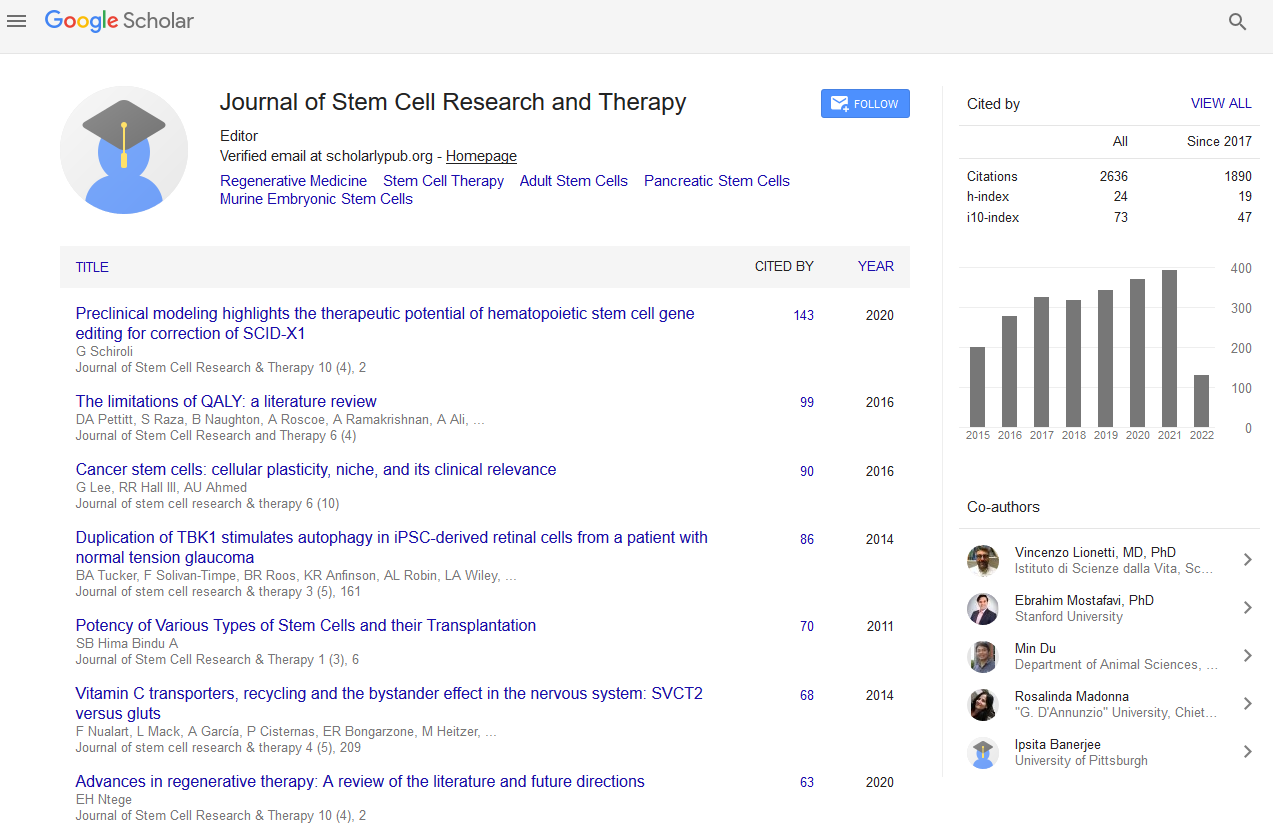Indexed In
- Open J Gate
- Genamics JournalSeek
- Academic Keys
- JournalTOCs
- China National Knowledge Infrastructure (CNKI)
- Ulrich's Periodicals Directory
- RefSeek
- Hamdard University
- EBSCO A-Z
- Directory of Abstract Indexing for Journals
- OCLC- WorldCat
- Publons
- Geneva Foundation for Medical Education and Research
- Euro Pub
- Google Scholar
Useful Links
Share This Page
Journal Flyer

Open Access Journals
- Agri and Aquaculture
- Biochemistry
- Bioinformatics & Systems Biology
- Business & Management
- Chemistry
- Clinical Sciences
- Engineering
- Food & Nutrition
- General Science
- Genetics & Molecular Biology
- Immunology & Microbiology
- Medical Sciences
- Neuroscience & Psychology
- Nursing & Health Care
- Pharmaceutical Sciences
Differentiation of mouse embryonic stem cell into elongated spermatid cells
3rd International Conference and Exhibition on Cell & Gene Therapy
October 27-29, 2014 Embassy Suites Las Vegas, USA
Seyedmehdi Nourashrafeddin
Scientific Tracks Abstracts: J Stem Cell Res Ther
Abstract:
Approximately 15% of couples are known to have reproductive problems. Embryonic stem cells (ESCs) are pluripotent stem cells derived from the inner cell mass that able to develop to any kind of cell. Recent studies have shown that soluble growth factors are able to govern progression of the mouse ESC into male germ-like cells in the absence of somatic cell support, and these mouse ESC-derived germ-like cells are able to induce normal fertilization and development in vitro. We inserted a fragment of Stra8 gene promoter (-1400 to +7) in ScaI/HindIII multiple cloning site of pEGFP-1 vector. Then electroporation carried out on embryonic stem cells and positive colonies were selected as puromycin-resistant after treatment with puromycin. All-trans retinoic acid (RA) was used for differentiation of mouse ESCs. We applied RT-PCR, Real-Time PCR and immunocytochemistry to analyze the differential expression of spermatogenesis specific molecular markers during different stages of mouse ESC differentiation in vitro parallel with mouse testis development in vivo. GFP-positive mESC colonies were observed after 72 h RA induction. We differentiate more GFP-positive mouse ESC with RA, and after 30 days of differentiation, typical elongated spermatids appeared in culture media. These germ cells expressed specific molecular markers during development stages in vitro as the same as testis development in vivo. The protamin 1 (Prm1) gene, as post meiotic marker, was expressed after 21 days of RA induction. These results leading us to suggest stem cell-based spermatogenesis in vitro using a backbone vector containing the fusion gene Stra8-EGFP as one of the alternative treatment for infertile subjects that suffering from azospermia. Moreover, we suggest the stem cell-based spermatogenesis in vitro as a potent systematic model for male germ cell development and spermatogenesis studies.
Biography :
Seyedmehdi Nourashrafeddin is a recent PhD graduate from Tabriz University of Medical Science, Iran, in the field of Molecular Medicine. He is currently working as an academic Research Assistant at Magee-Women?s Research Institute, University of Pittsburgh, USA. His research focuses on the molecular mechanisms that govern primate spermatogonial stem cell differentiation. His graduate school research focused on the analysis of gene expression during stem cell-based spermatogenesis in vitro. In 2005, he received his Master?s degree in the field of Immunology from Tehran University of Medical Sciences, Iran. In addition, from 2004-2006 he worked as a Research Assistant at the Hematology-Oncology and Stem cell Transplantation Research Center in Tehran, Iran. He is also an employee as Research Assistant in Tehran University of Medical Science. He has published more than 6 papers in reputed journals.


